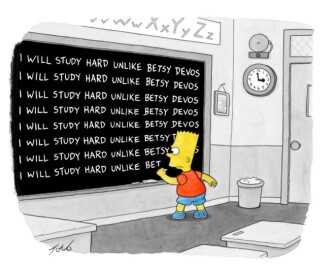
Betsy DeVos just took office and already is the object of New Yorker cartoonist Tom Torro’s barbs, and Andy Borowitz’ satire.
The script played out. Vice President Mike Pence was called on to cast the tie-breaking vote, the first in history for a cabinet secretary. Given the opposition that held the Senate floor for 24 hours, kept an overnight vigil at the Capitol, and jammed switchboards and email servers in Washington and home offices, it’s fair to say that Betsy DeVos will take office as the most vilified U.S. education secretary in history.
But it’s time to take Betsy DeVos seriously. Knowledgeable commentary from Peter Cunningham at the Hechinger Report and Alyson Klein at Education Week raised the question of whether and how she would be able to lead in the face of the new Elementary and Secondary Education Act that reduces the power of the U.S. Education Secretary. That statute, coupled with her obvious lack of knowledge of how the department works, are thought to portend a highly ineffectual secretary.
But Betsy DeVos doesn’t want to run the department of education. She doesn’t want to be Arne Duncan’s successor, or Margaret Spellings’ for that matter. She, like several of Donald Trump’s other cabinet officers, was chosen to fulfill chief strategist Stephen Bannon’s anti-institutional ideology and the Koch brothers “dark money” view that government should be available for purchase.
Betsy DeVos wants one thing: choice, and the more privatized and unregulated the better. That’s her track record and her belief system.
So, let’s take the worldview she espouses, examine the politics and policies involved, and later on we’ll contrast that with California’ direction.
The best introduction to DeVos’ thought may be contained in a speech she gave in 2015 to the SXSW tech conference in Austin, Texas. Valerie Strauss at the Washington Post posted her talk, and I recommend it to you.
Right at the beginning, DeVos fesses up: she’s a rich Republican. Then, she lays out her argument. It’s clear: “we must revolutionize our education delivery system in America. That’s it--that’s all I’m asking for. Open education up; allow for choice, innovation and freedom.”
She buttresses her argument with a series of “inconvenient truths,” a phrase I believe we’ve heard before from the previous Democratic candidate who didn’t become President by winning the popular vote. Our education system, she says, is “antiquated and quite frankly embarrassing,” it’s “been losing ground to other countries for at least half a century,” and that neither of our political parties can solve the problem because there’s gridlock in Washington. Thus, Inconvenient Truth #4: “government really sucks.” Actually, it sucks so much that she didn’t even bother to learn much about the department she will head and embarassed even Republicans at her confirmation hearing. [Unanswered questions.]
She wraps this in a blanket of morality. Rich people get choices, she notes. Suburban Republicans favor choice, but not for inner city kids coming to their schools. Democrats often oppose choice (the District of Columbia voucher system for example) while exercising it for their children. Approximately 40 percent of the members of Congress send their children to private schools. Thus, the rallying cry:
If you claim you are for freedom, if you claim to be an innovator or you value innovation, if you claim to be an entrepreneur, if you claim to believe in equal opportunity, if you claim to embrace social justice, then you have to embrace educational choice, and you have to embrace opening up our closed educational delivery system."
Betsy DeVos, I would hazard, doesn’t give a fig about running the traditional functions of the U.S. Department of Education. She wants to get federal money in the hands of private school operators as fast as she can. This includes relaxing the ban on funding scandal-ridden for profit higher education institutions. She will say that she is for states’ rights, but what she will mean is that is she favors of the rights of states to use vouchers, and she will offer them every encouragement to do so.
Unfortunately, there are a couple reciprocal inconvenient truths.
First, when put in practice, unregulated vouchers and charters, to use DeVos’ word, suck. These schools don’t work very well, they are prone to self-dealing leading to scandal, and they harm the remaining public school system.
Second, DeVos, joined by many other privatizers, fails to appreciate that education is a highly complex institution. There are many who work within it, who agree with DeVos’ assertion that the system is broken, but transforming it requires understanding how it works rather than simply asserting that it doesn’t.
Here DeVos fails, and her failure is all the more apparent to Californians who have invested the time and energy to rethink the system as a whole. The contrast couldn’t be sharper.
Tom Torro cartoon used by permission from the New Yorker. It’s also available for purchase.